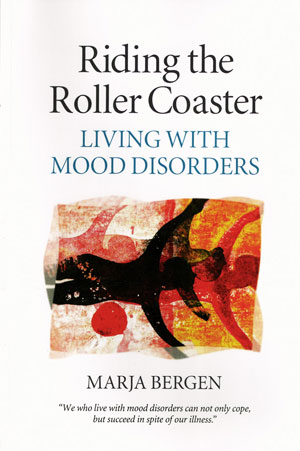
HOPE FOR A LIFE WITH MENTAL ILLNESS
Over the last few days my mind went back to Riding the Roller Coaster, a book I had published by Woodlake Publishers in 1999. It wasn’t hard for me to find a publisher at the time because it was one of the first books written by a person openly writing about her mental illness. And it was definitely the first written by such a person for the benefit for others living with mental illness.
One of the main messages of the book was that being diagnosed with a mental illness didn’t have to mean the end of the world. I truly believed that, and still do. My life at that point had proved that one could do a lot more than survive. A good life is possible, even with a severe mental illness.
I proceeded, chapter by chapter, showing the many ways in which we can create a rich life for ourselves, despite our mental health issues. The book describes a pattern of living designed to keep people with mood disorders stable. It shows readers that they don’t need to be victims. They can rise to be victors.
The book is filled with encouragement, and coping skills gathered from 35 years of experience living with bipolar 1 disorder. Many personal anecdotes are included, describing what the symptoms look like. The anecdotes portrayed the good times and the hard times I experienced. As a book, Roller Coaster works hard to build confidence in the person needing help and understanding in the person who wants to be of help.
The chapter on Building Confidence caught my eye. Confidence building for people with low self-esteem is a major reason I wrote Justice for All. Some of the topics explored were: The Importance of Being Active; Rise, Check Your Diary, and Shine; Finding Meaning in Life; Overcoming Obstacles; Building Skills, Talents, Hobbies, Career.
The advice for good living covered in this book would benefit anyone, whether they have a mental health condition or not. And yet, it’s so important that individuals who are struggling be reminded by the people who want to care for them.
In depression, for example, people’s good habits go by the wayside. It’s hard to motivate oneself to do anything, let alone eat a good meal or go for a walk. They need a friend to remind them. They would benefit from having someone stay close (though not necessarily in person} as they work their way out of the mud and mire. Could you be such a friend?
An important part of offering effective support to people with mental health issues is to promote the basic healthy living skills included in Riding the Roller Coaster. The book is still in print, having been in circulation for 22 years now. The advice it offers is as good today as when the book was first written.
And I wonder to myself: Where is that voice that once cheered people on? Where are they getting that kind of encouragement now?
“Having a mental illness is not the end of the world”
marja
Riding the Roller Coaster by Marja Bergen is available from Woodlake Books or Amazon. I also have a copies available.
Leave a Reply